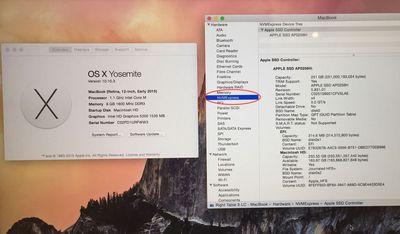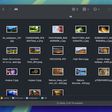Faster 'NVM Express' SSD Interface Arrives on Retina MacBook and OS X 10.10.3
Apple has quietly introduced support for the next generation NVM Express (NVMe) interface to SSD Flash drives in their latest OS X 10.10.3 update as well as in the new Retina MacBook which was released on April 10th.

System Report on new Retina MacBook
The NVMe software interface replaces the AHCI software interface in Apple's previous notebooks, and offers improved latency and performance over the old protocol. Anandtech
offers a good overview between the technologies:
AHCI (Advanced Host Controller Interface) dates back to 2004 and was designed with hard drives in mind. While that doesn't rule out SSDs, AHCI is more optimized for high latency rotating media than low latency non-volatile storage. As a result AHCI can't take full advantage of SSDs and since the future is in non-volatile storage (like NAND and MRAM), the industry had to develop a software interface that abolishes the limits of AHCI.
The result is NVMe, short for Non-Volatile Memory Express.
The new protocol is not to be confused with the underlying hardware that connects the SSD to Apple's notebooks. Apple has already upgraded the physical interface to the much faster PCIe connectors a number of years ago.
Going into the future, NVMe will allow Apple's hardware to take further advantage of the performance of SSDs as well as improve battery life with less time spent transferring data. Intel expects NVMe to also be coming to tablets and phones in the near future.
Thanks Jonathan
Popular Stories
U.S. President Donald Trump on Wednesday announced that steep tariffs will be applied to imports from many countries, starting April 9. The tariffs could have a significant impact on Apple, as the company assembles the majority of iPhones in China, and products imported to the U.S. from China will be subject to a 54% tariff.
iPhone prices could increase by up to 43% in the U.S. due to the...
iOS 19 will not be available on the iPhone XR, iPhone XS, or the iPhone XS Max, according a private account on social media site X that has accurately provided information on device compatibility in the past.
The iPhone XR, iPhone XS, and iPhone XS Max all have an A12 Bionic chip, so it looks like iOS 19 will discontinue support for that chip. All other iPhones that run iOS 18 are expected...
Apple today released watchOS 11.4, the fourth major update to the operating system that runs on the Apple Watch. watchOS 11.4 is compatible with the Apple Watch Series 6 and later, all Apple Watch Ultra models, and the Apple Watch SE 2.
watchOS 11.4 can be downloaded on a connected iPhone by opening up the Apple Watch app and going to General > Software Update. To install the new software,...
If you have an older Apple device that you've been considering upgrading, you're probably wondering how the newly announced tariffs might impact prices going forward, and whether it's worth buying now before there's a price hike.
Given analyst and economist responses to the tariffs, market panic, and Trump's stance on the current financial chaos, the answer is that making a purchase...
Apple is reportedly planning a major upgrade to the Telephoto camera in the iPhone 17 Pro, and while it may seem like a step back on paper, the change could actually improve real-world usability, if one leaker's claims are anything to go by.
According to Majin Bu, the iPhone 17 Pro will feature a new Telephoto lens with a 48MP sensor, up from the current 12MP sensor found in the iPhone 16...
While the iPhone 17 Pro and iPhone 17 Pro Max are not expected to launch until September, there are already plenty of rumors about the devices.
Below, we recap key changes rumored for the iPhone 17 Pro models as of March 2025:
Aluminum frame: iPhone 17 Pro models are rumored to have an aluminum frame, whereas the iPhone 15 Pro and iPhone 16 Pro models have a titanium frame, and the iPhone ...
Apple today seeded the first betas of upcoming iOS 18.5 and iPadOS 18.5 updates to developers for testing purposes, with the software coming just two days after Apple released iOS 18.4 and iPadOS 18.4.
iOS 18.5 and iPadOS 18.5 can be downloaded from the Settings app on a compatible device by going to General > Software Update.
We don't yet know what Apple is introducing in the iOS 18.5...
 System Report on new Retina MacBook
System Report on new Retina MacBook



















